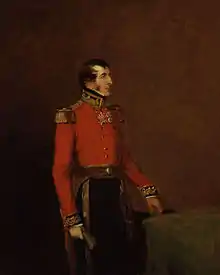Henry Murray (British Army officer)
General The Honourable Sir Henry Murray KCB (6 August 1784 – 29 July 1860) was a British Army officer who fought in the Napoleonic Wars. As the younger son of an earl, he is sometimes styled "the Honourable".
Sir Henry Murray | |
|---|---|
 Sir Henry Murray by William Salter | |
| Born | 6 August 1784 |
| Died | 29 July 1860 |
| Allegiance | |
| Service/ | |
| Rank | General |
| Commands held | Western District |
| Battles/wars | Napoleonic Wars |
| Awards | Knight Commander of the Order of the Bath |
Biography
Murray, born 6 August 1784, was the fourth son of David Murray, 2nd Earl of Mansfield, and his second wife, Louisa, daughter of Charles Cathcart, 9th Lord Cathcart.[1]
Murray was commissioned a cornet in the 16th Dragoons on 16 May 1800 and a second lieutenant on 11 June 1801. On 26 June 1801 he was promoted to first lieutenant in the 10th Dragoons, and a captain on 24 August 1802. He was a captain in the 20th Dragoons from 5 November 1802.[2]
Between 1805-07 he served as aide-de-camp for his uncle Lord Cathcart in Ireland and Egypt then as a major in the 26th Cameronians during the Walcheren Campaign (1809) and its siege of Flushing.[3] Having joined the 26th on 26 March 1807 he remained with them for three years. On 2 August 1810 he joined the 18th Hussars as a major. He remained with the 18th Dragoons until the end of the Napoleonic Wars, being promoted to Lieutenant-Colonel of the Regiment on 2 January 1812.[2] During a crossing of the Esla River while with the 18th Hussars, his horse fell severely injuring him after which he spent some time in the hospital at Palencia.[4] He was present at the Battle of Morales (2 June 1813), despite still suffering from the severe wound to his knee.[1]
Two days after, inflammation set in in the knee, yet he followed the regt. in a spring waggon in rear, till upon the representation of the surgeon that if he went on with the troops he must die, he was sent back to the hospital station at Palencia, where, with abscess and acute rheumatism, he nearly died
— Col. Malet's Records 18th Hus.[1]
He took part in the Battle of Quatre Bras (16 June 1815) before leading the retreat the following day.[4] At the Battle of Waterloo (18 June 1815) he led the 18th Hussars[5] as part of Sir Hussey Vivian's charge at the conclusion of the battle.[1]
He became General Officer Commanding Western District in 1842.[6] During the latter part of his life, Murray resided at Wimbledon Lodge and died there on 29 July 1860. There is a memorial to him in St Mary's Church, Wimbledon[1] and a further copy in the Garrison Church of the Royal Citadel, Plymouth.[7]
Family
On 28 June 1810 Murray married Emily, daughter of Gerard de Vismé, and had children.[1] Their son, Arthur Stormont Murray of the Rifle Brigade was killed at the age of 28 in August 1848 at the head of a company fighting the Boers at Bloem Platts in the Cape of Good Hope.[7]
Notes
- Dalton 1904, p. 91.
- Philippart 1820, pp. 401-402.
- "General Hon Sir Henry Murray KCB". Retrieved 9 September 2015.
- Bromley & Bromley 2015, p. 1797.
- Haythornthwaite 2007, p. 71.
- Colburn 1843, p. 301.
- Bromley & Bromley 2015, p. 1798.
References
- Bromley, Janet; Bromley, David (2015). Wellington's Men Remembered Volume 2: A Register of Memorials to Soldiers who Fought in the Peninsular War and at Waterloo- Volume II: M to Z. Pen and Sword. ISBN 978-1-4738-5768-1.
- Colburn, Henry (1843). United Service Magazine. p. 301.
- Haythornthwaite, Philip (2007). The Waterloo Armies: Men, Organization and Tactics. Pen and Sword. p. 71. ISBN 978-1-4738-1975-7.
- Philippart, John (1820), The Royal military calendar, or Army service and commission book. Containing the services and progress of promotion of the generals, lieutenant-generals, major-generals, colonels, lieutenant-colonels, and majors of the army, according to seniority: with details of the principal military events of the last century, 4, London: Printed by A.J. Valpy, sold by T. Egerton etc, pp. 401–402
Attribution
 This article incorporates text from a publication now in the public domain: Dalton, Charles (1904), The Waterloo roll call. With biographical notes and anecdotes, London: Eyre and Spottiswoode, p. 91
This article incorporates text from a publication now in the public domain: Dalton, Charles (1904), The Waterloo roll call. With biographical notes and anecdotes, London: Eyre and Spottiswoode, p. 91
Further reading
- Armed Forces: Units: British Cavalry: 7th Dragoon Guards, British Empire, retrieved 6 October 2019 — contains a "photogravure of Murray as a 28 year-old is from a pencil drawing by Cosway made when he was a Lieutenant-Colonel commanding the 18th Hussars."
- Darryl, Lundy (14 September 2011), General Hon. Sir Henry Murray, Thepeerage.com, p. 3608 § 36077, retrieved 6 October 2019
| Military offices | ||
|---|---|---|
| Preceded by Robert Ellice |
GOC Western District 1842–1852 |
Succeeded by Sir Harry Smith |